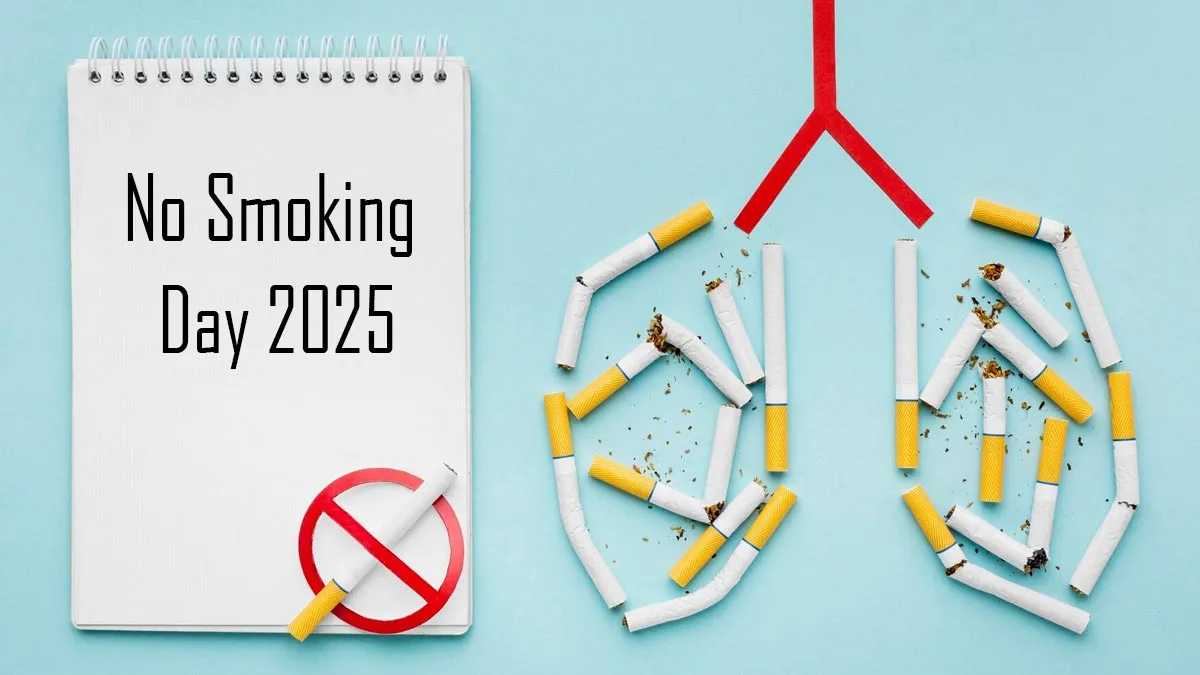
No Smoking Day is observed every year on the second Wednesday of March. This day encourages smokers to quit and helps people understand the dangers of tobacco. In 2025, No Smoking Day falls on March 12. On this day, people around the world promote smoke-free lives and work to reduce health risks caused by tobacco.
Table of Content:-
The day started in the United Kingdom in 1984. Since then, it has become a global event supported by governments, healthcare groups, and NGOs. The day focuses on helping people quit smoking through campaigns, free resources, and community support. With over 8 million deaths linked to tobacco every year, this day plays a big role in saving lives. Read ahead to know more about the history, importance, and key facts of No Smoking Day 2025.
History of No Smoking Day
-1741753953129.jpg)
No Smoking Day began in the UK as a small campaign but grew quickly because of concerns about smoking-related illnesses. In 1984, health professionals and anti-smoking activists created this day to help people quit smoking. Over time, the campaign spread to other countries, as they also faced similar public health challenges.
The day’s success comes from its positive approach. Instead of blaming smokers, it offers practical tools like quitlines, apps, and support groups to make quitting easier. Each year, themes like ‘Quit for Good’ or ‘Take Back Control’ inspire people to join the movement. Today, millions of people use No Smoking Day as their starting point to quit tobacco.
ALSO READ: World Obesity Day 2025: Theme, History, And How It’s Shaping The Fight Against Obesity
Why No Smoking Day Matters
Smoking habits continue to rank as the main preventable reason that causes fatal outcomes among people across the globe. The World Health Organization (WHO) reports that smoking results in heart disease and lung cancer alongside stroke yet secondhand smoke poses threats to both children and adults who do not smoke. This day functions to make people aware of smoking perils and provides individuals with options to prevent them.
The financial costs of the problem are equally concerning. The Global Burden of Disease Project demonstrated through research in 2022 that tobacco use generates more than $1.4 trillion of yearly economic cost from healthcare treatments and diminished productive capacities across the world. Communities that reduce smoking rates become able to invest their saved money into essential areas such as education and infrastructure development.
How Smoking Affects The Brain and Nervous System?
-1741753987467.jpg)
Nicotine creates a temporary sense of calm by triggering dopamine and serotonin release, which improve mood and focus. However, this relief is short-lived. Over time, smoking disrupts brain chemistry, worsening anxiety and stress levels. Dr Sunil Singla, Director and Head of Department, Department of Neurology, SHALBY Sanar International Hospitals, Gurugram explains: “Nicotine stimulates dopamine for pleasure, glutamate for alertness, and endorphins for relaxation—masking withdrawal symptoms, not curing stress.” Chronic use alters neural pathways, deepening dependency and harming the nervous system’s stress response.
ALSO READ: Can Vaping Damage Your Vision? Eye Expert Shares How Nicotine Could Be Affecting Your Eyes Health
Key Study: How No Smoking Day Changes Lives
A study published in the Journal of Public Health highlighted the effectiveness of awareness campaigns like No Smoking Day. Researchers analysed data from 10,000 participants across five countries and found that smokers who engaged in No Smoking Day events were 35% more likely to attempt quitting compared to those who didn’t. Additionally, the study revealed a 15% increase in successful quit rates among participants who used free resources provided on the day.
The study also noted that social media campaigns played a significant role, especially among younger adults. Hashtags like #QuitFor2025 and motivational stories shared online created a sense of community, making quitting feel achievable. These findings prove that structured support and public engagement can drive meaningful change.
How to Participate in No Smoking Day 2025

Your smoking cessation journey should start on March 12. Some of the ways on how one can participate are mentioned below.
- The use of quit-smoking applications or membership in nearby support communities provides essential assistance.
- Organise workshops with educational content for the public and distribute pertinent facts through social media platforms.
- Offer patients with smoking addiction psychological support rather than intimidation when they attempt to stop using cigarettes.
- Demand local representatives to develop legislation that bans smoking in all public areas.
ALSO READ: Cold Weather and Cigarettes: Heightened Risks for Heart Disease and Impaired Lung Health
Conclusion
No Smoking Day 2025 (March 12) serves as a critical time which supply help to those fighting addiction while demonstrating shared abilities to promote healthier communities. This day provides both transformative options and sincere hope to anybody who wants to break free from tobacco addiction or seeks cleaner outdoor air conditions. Participation combined with historical insight and evidence-based method backing allows us to reverse the tobacco epidemic. The victory of abstaining from smoking deserves commemoration in every passing day.
Also watch this video
Read Next
Bigg Boss OTT 3 Winner Sana Makbul Opens Up About Autoimmune Hepatitis Diagnosis; Know All About It
How we keep this article up to date:
We work with experts and keep a close eye on the latest in health and wellness. Whenever there is a new research or helpful information, we update our articles with accurate and useful advice.
Current Version